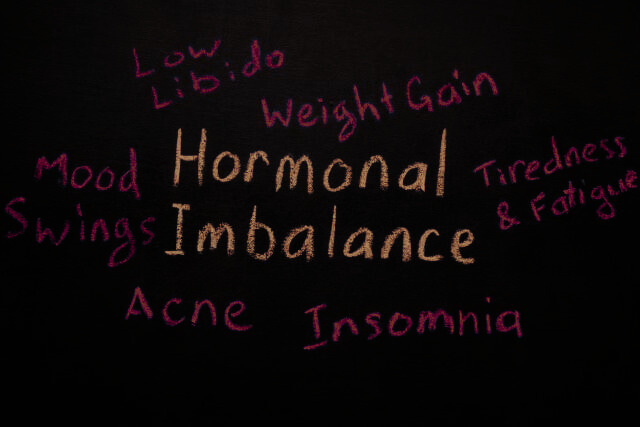
Everyday Signs of Hormonal Imbalance You Might Miss
Have you ever felt “off” in your own body and couldn’t explain why? Maybe you were always tired, gaining weight for no reason, or suddenly breaking out with acne like a teenager. Sometimes, these are more than random changes, they can be signs of hormonal imbalance.
Hormones are like little messengers in your body. They travel through your blood, telling different parts of your body what to do and when to do it. They help control things like your mood, sleep, appetite, energy, and even how your skin looks.
When your hormones are in balance, everything runs smoothly, like a well-organized classroom. But when they are out of balance, things can get messy, and your body starts sending you warning signs. Let’s break it down in simple terms so you can spot the everyday signs of hormonal imbalance you might miss.
What Are Hormones and Why Do They Matter?
Think of hormones as traffic lights inside your body. They signal when it’s time to stop, go, or slow down. Without them, your body wouldn’t know how to function properly.
Hormones affect:
- Sleep – when you feel awake or sleepy.
- Mood – whether you feel calm, happy, or anxious.
- Energy levels – whether you feel ready to run or want to nap.
- Appetite – when you feel hungry or full.
- Growth and development – especially during puberty.
- Reproduction – periods, fertility, and sexual health.
When the “traffic lights” (hormones) get out of sync, your body may give you signals that something isn’t right.
Everyday Signs of Hormonal Imbalance
1. Unexplained Weight Changes
Have you noticed sudden weight gain even when your eating habits haven’t changed? Or maybe you’re losing weight without trying?
This may be due to thyroid hormones, insulin, or cortisol being out of balance. These hormones control how your body uses food for energy. When they’re off, your body may store fat more easily, or burn it too quickly.
2. Constant Fatigue or Low Energy
Feeling tired is normal after a long day. But if you’re exhausted all the time, even after sleeping well, it might be your hormones.
The thyroid gland produces hormones that regulate your energy. If it makes too little (hypothyroidism), you feel sluggish. If it makes too much (hyperthyroidism), you might feel restless but still drained.
3. Mood Swings, Anxiety, or Depression
Ever felt like your emotions are all over the place? That could be hormones too.
- Estrogen and progesterone influence mood, especially in women.
- Cortisol (the stress hormone) can cause anxiety when levels stay high.
- Serotonin, a “feel-good” chemical, is also tied to hormones.
Think of hormones like the volume control for your feelings. When they’re unbalanced, emotions can swing from high to low unexpectedly.
4. Irregular or Painful Periods
For women, one of the clearest signs of hormonal imbalance is changes in the menstrual cycle.
- Periods that are late, too early, or skipped may be linked to PCOS (polycystic ovary syndrome) or thyroid problems.
- Very painful or heavy periods can also signal hormone disruptions.
Your cycle is like a monthly report card from your body. It shows how well your hormones are working.
5. Trouble Sleeping (Insomnia)
Do you toss and turn at night even when you’re tired? Hormones may be to blame.
- Melatonin helps you fall asleep.
- Cortisol helps wake you up.
When cortisol is high at night (often from stress), it confuses your sleep clock. That’s why you may lie awake even when you want to rest.
6. Skin Changes: Acne, Dryness, or Hair Growth
Hormones also control your skin health. If you’re suddenly getting acne as an adult, it might be due to testosterone or estrogen imbalance.
Dry skin, rashes, or unwanted hair growth (like chin hairs in women) may also be hormonal signals. Remember, acne isn’t just a “teenage thing.” Adults get it too when hormones are off.
7. Digestive Problems (Bloating, Constipation, Diarrhea)
Your gut and hormones are best friends, they work together. When stress hormones like cortisol are high, digestion slows down or speeds up too much.
That’s why some people feel bloated, constipated, or even have diarrhea when stressed or hormonally unbalanced.
8. Low Sex Drive
Not feeling “in the mood” anymore? Low libido can be linked to low testosterone, estrogen, or progesterone.
In simple terms: hormones act like a switch for intimacy. If they’re low or unbalanced, that switch doesn’t turn on as easily.
9. Hair Loss or Thinning Hair
If your hairbrush seems fuller than usual, hormones could be the reason.
- Thyroid problems often cause hair loss.
- Stress and high cortisol also affect hair growth.
Think of your hair as a plant. Hormones are like the water supply. Without enough “water,” the plant (hair) weakens.
10. Hot Flashes or Night Sweats
Common in women going through menopause, but can also signal thyroid imbalance.
If you’re suddenly overheating, sweating at night, or having chills, your hormones might be sending strong signals.
What Causes Hormonal Imbalance?
Hormonal imbalance can be triggered by:
- Stress (too much cortisol).
- Poor diet (too much sugar or processed food).
- Lack of sleep.
- Medical conditions like PCOS, diabetes, or thyroid disease.
- Medications (birth control, steroids).
- Natural life stages – puberty, pregnancy, Menopause.
When to See a Doctor
Not every symptom means you have a serious problem. But you should see a doctor if:
- Symptoms last for weeks or months.
- You experience extreme fatigue, sudden weight changes, or severe mood shifts.
- Your periods are very irregular or painful.
Keeping a symptom diary (writing down changes in your body) can help your doctor spot patterns.
Everyday Tips to Support Hormonal Balance
Good news: lifestyle changes can help keep hormones steady.
- Eat a balanced diet – include fiber, whole grains, healthy fats, and lean protein.
- Exercise regularly – even walking helps balance hormones.
- Sleep well – aim for 7–9 hours each night.
- Manage stress – try deep breathing, yoga, or meditation.
- Limit sugar and caffeine – too much can spike hormones.
Conclusion
Hormonal imbalance can feel overwhelming, but your body always gives you clues. From weight changes and fatigue to mood swings and skin issues, these everyday signs are worth paying attention to.
Remember: some changes are normal, but if symptoms stick around or get worse, don’t ignore them, see a doctor. By understanding your body and making small lifestyle changes, you can help keep your hormones balanced and your health on track.
FAQs
Q1: Can stress alone cause hormonal imbalance?
Yes! Stress raises cortisol levels, which can throw off sleep, digestion, and even periods.
Q2: Do men experience hormonal imbalance too?
Absolutely. Men can also have low testosterone, thyroid issues, or stress-related hormone problems.
Q3: Is hormonal imbalance permanent?
Not always. Many cases improve with lifestyle changes, stress management, or medical treatment.
Q4: Can diet and exercise fix hormonal imbalance?
They help a lot, but serious imbalances may need medical treatment.
All Categories
Recent Posts
Why SDG 4 Cannot Be Achieved Without Ending Period Poverty
Tags
Give them a helping hand
Every donation fuels our mission to combat period poverty. Your generosity brings us closer to menstrual equity.
+234-909-482-1642
inquiries@blossomflow.org




